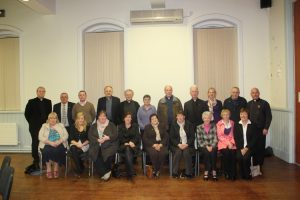|
Constitution for the Kilmore Diocesan Pastoral Council (amended June 2011)
|
|
The Kilmore Diocesan Pastoral Council was established in February 2001 and meets approximately 4 times a year. It is a representative body of the faithful which works in close partnership with the bishop to further the mission of the church in the diocese of Kilmore. It is concerned primarily with people and with building up the faith, hope and love that cements them into a real, living and caring Christian community. The role of the diocesan pastoral council is consultative and advisory in nature. The diocesan pastoral council will work in partnership with other existing structures in the diocese including the college of consulters, the council of priests, the diocesan focus group, other diocesan committees and the pastoral area teams. Aims The purpose of the Diocesan Pastoral Council is described in Canon Law as follows: ‘Its function, under the authority of the Bishop, is to study and weigh those matters which concern the pastoral works in the diocese and to propose practical conclusions concerning them’. [Can. 511]. Membership The Pastoral Council will consist of not more than 30 people including: 1. The bishop of the diocese.
2. The vicar general(s).
3. One lay person and a priest from each pastoral area.
4. One female religious and one male religious representing the religious communities.
5. One representative from each of the following committees – missions, vocations,
catholic primary school management association.
6. The members of the diocesan pastoral team.
The bishop may, in consultation with the diocesan pastoral council, co-opt an individual or individuals onto the pastoral council if this is deemed necessary in a particular situation or to address any imbalance in membership. The representatives from the pastoral areas and the two representatives form the religious communities are to be elected by their respective bodies. A procedure will be put in place to ensure that the youth of the diocese are adequately and appropriately represented on the council.
General Functioning 1. The Bishop, or in his absence, the Vicar General of the Diocese will preside over the meetings of the Pastoral Council. 2. The Chairperson is to be elected by the members of the Diocesan Pastoral Council. His/her main function will be to facilitate the smooth running of the meetings. 3. The Secretary is also to be elected by the members of the Diocesan Pastoral Council. His/ her name main function will to be to ensure that the administration of the Council is smooth and effective and to take minutes of each meeting. 4. The Pastoral Council will meet a minimum of 4 times each year. 5. The Secretary will send notification of and an agenda for each meeting to the members of the Diocesan Pastoral Council at least seven days in advance of each meeting. 6. The minutes of each meeting will be sent to each parish priest in full-time ministry in the diocese and to the secretary of each Parish Pastoral Council, Pastoral Area Team and each Religious Community. 7. Each meeting will include a period of reflective Scripture based prayer and each meeting will conclude with a brief prayer. 8. The Diocesan Pastoral Council will serve for five years from its first meeting, after which new elections must take place. A member may serve for two consecutive terms. 9. Any member failing to attend four consecutive meetings without a reasonable explanation will be deemed to have resigned. Any vacancy will be filled by co-opting a new member who has been nominated by the relevant constituent group on the council. Vacancies caused by normal resignation etc during the course of its term will be filled in the same manner. 10. A quorum will consist of half the members of the Diocesan Pastoral Council. 11. Meetings will be conducted in a spirit of true listening and genuine dialogue. 12. The Diocesan Pastoral Council will establish a Standing Committee comprising of the Bishop (or his nominee), the Chairperson and the Secretary, a representative from the Diocesan Pastoral Team and a representative of the general membership of the Council. The main function of the Standing Committee will be to prepare the agendas for meetings, review minutes and make recommendations in relation to Council deliberations and activities.
 Members of the Diocesan Pastoral Council 2011-16 |





